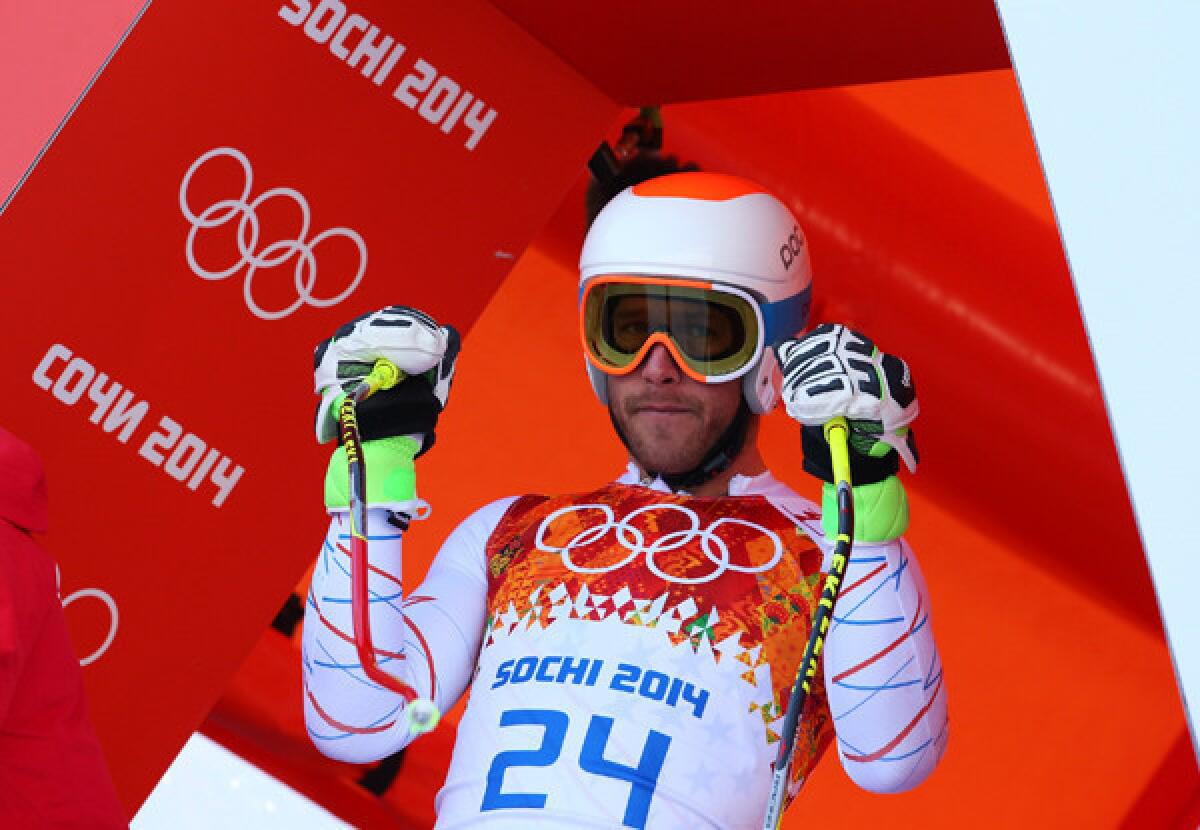U.S. men face tough challenge in super-giant slalom at Sochi Olympics

SOCHI, Russia -- The U.S. men are still on the alpine clock in Sochi and haven’t made very good time.
The second Olympic weekend is almost put to bed and the Americans have yet to hang anything resembling a medal around their necks.
They are on pace to match the Austrian men, who shockingly failed to win a medal four years ago in Vancouver, Canada.
If Bode Miller and his boys are going to get their skis turned around in Sunday’s super-giant slalom at Rosa Khutor, though, they’ll probably have to go through Norway.
The Norwegians have won the last three Olympic super-G events and four of the last six.
Kjetil Andre Aamodt claimed three of his four gold medals in super-G — 1992, 2002 and 2006 — and won bronze in 1994.
The defending Olympic champion, Aksel Lund Svindal, is Norway’s all-around excellent heir to Aamodt.
In Vancouver, Svindal won gold ahead of America’s Miller and Andrew Weibrecht.
This is seemingly a strong event for the U.S., with current super-G world champion Ted Ligety joining Miller and Weibrecht.
Downhill, though, was also supposed be a strong medal chance, but the best America could offer was Miller’s eighth.
Friday’s super combined was to offer hope, with Ligety and Miller as the last two Olympic champions. Miller and Ligety finished sixth and 12th, respectively.
Taking down Svindal will be a formidable task as he has won six of the last 10 super-G World Cup events.
“Aksel is the best super-G skier in the world,” Ligety said last week. “He’s the guy to beat for sure. He has the skill set to be good on any hill, whether it’s a glider’s hill or a turner’s hill. This is kind of a hill where it’s in between.”
Svindal is clearly looking to make amends after finishing fourth in the downhill and eighth in the super combined.
Svindal was sixth after the morning downhill but dropped two spots after posting only the 12th-fastest slalom time.
“I wasn’t happy with my time and I’m a little angry,” he said.
Weibrecht returns to the Olympics four years after he won his surprising bronze in super-G.
Weibrecht is the classic one-hit wonder in that he never has won a medal in a major race before Vancouver — or since.
Weibrecht, from Lake Placid, N.Y., is known as “The War Horse” for his reckless skiing style. He has the scars to prove it.
He all but donated his body to science after Vancouver, injuring his right shoulder right after the Olympics.
Later that year he dislocated his left shoulder in Austria, had right ankle reconstruction surgery in 2012 and was saddled with illness and injury for most of the 2012-13 season.
One of Weibrecht’s best qualities is his short-term memory.
He face-planted his slalom in Friday’s combined and forgot about it almost immediately.
“By the time I stood back up, I think I was past it,” he said.
Other favorites in the super-G will be Switzerland’s Patrick Kueng, recently crowned downhill champion Matthias Mayer of Austria and Christof Innerhofer of Italy.
Ligety has joked Weibrecht is the fastest racer in the world, in every event, for the first 20 seconds.
“He has the ability to put it together on race day, you saw the last Olympics he was able to do that,” Ligety said of Weibrecht. “He’s the guy I always like watching because you never really know what’s going to happen because he takes a lot of risks.”
Twitter: @DufresneLATimes
Go beyond the scoreboard
Get the latest on L.A.'s teams in the daily Sports Report newsletter.
You may occasionally receive promotional content from the Los Angeles Times.




